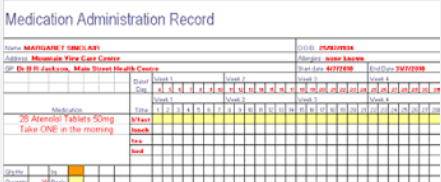If you’ve been given several different types of medication by your GP, you know how important it is to take them at the right time and in the right way. This is why those who administer medications as part of their job should be aware of how to give the right dose. Failure to administer medication in the right way could result in overdoses, adverse reactions and even death.
Record keeping
Medication awareness is a vital part of running a care home, with many elderly residents having different schedules. As well as checking lists of medications, sorting the tablets and giving them at the right time, there is also a need to document this on their medication record. All medication needs to be accurately documented in order to comply with Care Quality Commission (CQC) rules and legislation.
It’s also important that, wherever possible, the individual being given the medication is fully informed and understands what they are taking it for, as well as any possible side effects.
The CQC, which is the independent regulator of health and adult social care in England, says that care providers’ medication policies should include training needs for staff. This training should be accessible and relevant to the type of care setting and should be ongoing. When researching administration of medical training courses, look for specialist providers such as www.tidaltraining.co.uk/health-and-social-care-courses/safe-handling-medication-training which offer comprehensive courses on how to handle medication safely.
Failure to understand how to handle medication correctly could result in serious errors such as giving the wrong dose, incorrect crushing of tablets, or administering medication at the wrong time, any of which can cause harm to the individual.
Required content
Courses in administration of medical training should include information on current regulations, an overview of the types of drugs available, categories of medication, drug storage, handling and disposal, record keeping, as well as other general principles which form the basis of an organisation’s medical policies and procedures. Training can be in person or online and once completed, staff should be regularly assessed as competent in order to ensure safe medication practices within the organisation.




